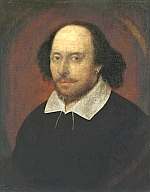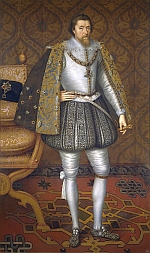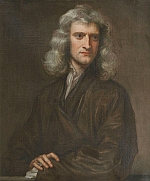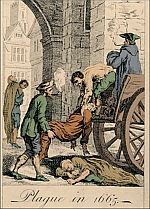| |
Date |
Event(s) |
| 1 | 1564 | - 26 Apr 1564—23 Apr 1616: William Shakespeare is born

William Shakespeare was an English playwright, poet and actor. He is widely regarded as the greatest writer in the English language and the world's pre-eminent dramatist. He is often called England's national poet and the "Bard of Avon" (or simply "the Bard"). His extant works, including collaborations, consist of some 39 plays, 154 sonnets, three long narrative poems, and a few other verses, some of uncertain authorship. His plays have been translated into every major living language and are performed more often than those of any other playwright.
|
| 2 | 1603 | - 24 Mar 1603—27 Mar 1625: The Reign of King James I

James VI and I (James Charles Stuart; 19 June 1566 – 27 March 1625) was King of Scotland as James VI from 24 July 1567 and King of England and Ireland as James I from the union of the Scottish and English crowns on 24 March 1603 until his death in 1625. Although he wanted to bring about a closer union, the kingdoms of Scotland and England remained individual sovereign states, with their own parliaments, judiciaries, and laws, both ruled by James in personal union.
James was the son of Mary, Queen of Scots
|
| 3 | 1620 | - 9 Nov 1620: The Mayflower arrives in America

On September 6, the Mayflower departed from Plymouth, England, and headed for America. The voyage itself across the Atlantic Ocean took 66 days, from their departure on September 6, until Cape Cod was sighted on 9 November 1620. The colonists spent that first winter living onboard the Mayflower.
Of the 102 passengers on the ship, which was 80 feet long and 24 feet wide, only 53 passengers and half the crew survived. Women were particularly hard hit; of the 19 women who had boarded the Mayflower, only five survived.
The Plymouth Colony is formed until 1685 when it is split into three counties: Plymouth, Barnstable, and Bristol
Caleb Johnson's Mayflower History
|
| 4 | 1630 | - 7 Sep 1630: The Town of Watertown, Massachusetts is Incorporated
In July of 1630, Sir Richard Saltonstall and Reverend George Phillips and others from the Winthrop fleet row up the river from Charlestown and settle Watertown.
In September, the settlement is officially incorporated into the Massachusetts Bay Colony as Watertown.
In 1665 The Old Burying Ground is established on what is now modern day Arlington Street.
On July 19, 1776 the Treaty of Watertown is signed at the Edmund Fowle House. The treaty establishes a military alliance between the United States and the St. John’s Indians and some of the Mi’kmaw bands against Great Britain in the Revolutionary War.
|
| 5 | 1642 | - 22 Aug 1642—3 Sep 1651: English Civil War
The English Civil War (1642–1651) was a series of civil wars and political machinations between Parliamentarians ("Roundheads") and Royalists led by Charles I ("Cavaliers"), mainly over the manner of England's governance and issues of religious freedom. It was part of the wider Wars of the Three Kingdoms. The first (1642–1646) and second (1648) wars pitted the supporters of King Charles I against the supporters of the Long Parliament, while the third (1649–1651) saw fighting between supporters of King Charles II and supporters of the Rump Parliament. The wars also involved the Scottish Covenanters and Irish Confederates. The war ended with Parliamentarian victory at the Battle of Worcester on 3 September 1651.
Unlike other civil wars in England, which were mainly fought over who should rule, these conflicts were also concerned with how the three Kingdoms of England, Scotland and Ireland should be governed. The outcome was threefold: the trial of and execution of Charles I (1649); the exile of his son, Charles II (1651); and the replacement of English monarchy with the Commonwealth of England. From 1653 the Commonwealth of England, Scotland, and Ireland unified the British Isles under the personal rule of Oliver Cromwell (1653–1658), and briefly his son Richard (1658–1659).
In England, the monopoly of the Church of England on Christian worship was ended, and in Ireland, the victors consolidated the established Protestant Ascendancy. Constitutionally, the outcome of the wars established the precedent that an English monarch cannot govern without Parliament's consent, though the idea of Parliamentary sovereignty was legally established only as part of the Glorious Revolution in 1688.
- 25 Dec 1642—20 Mar 1727: Sir Isaac Newton is born

Physicist, mathematician and inventor. Laid the foundation of classical mechanics, which formed the basis of physical science until Einstein. Formulated universal laws of motion and the law of universal gravitation. Demonstrated how these laws explained both the motion of planets and comets and objects on Earth. Invented a form of the calculus. Invented the first practical reflecting telescope. Proposed that Earth was an oblate spheroid. Calculated the speed of sound.
|
| 6 | 1643 | |
| 7 | 1664 | - 1664: The Town of Dartmouth, Massachusetts is Incorporated
In 1652, English colonists purchased Old Dartmouth—a region of 115,000 acres (470 km2) that is now Dartmouth, Acushnet, New Bedford, Fairhaven, and Westport—in a treaty between the Wampanoag—represented by Chief Ousamequin (Massasoit) and his son Wamsutta—and high-ranking "Purchasers" and "Old Comers" from Plymouth Colony: John Winslow, William Bradford, Myles Standish, Thomas Southworth, and John Cooke.
According to the deed, in one year, all Natives previously living on the land would have to leave. This led to a lengthy land dispute as the deed did not define boundary lines, and the younger son of Massasoit, Metacomet, began to question the boundary lines of the purchase. Metacomet stated that he had not been consulted about the sale, and he had not given his written permission. The situation culminated with new boundaries drawn up by referees. Chief Massasoit gave his final permission to the changes in 1665.
|
| 8 | 1665 | - 1665—1666: Great Plague of London

The Great Plague of London, lasting from 1665 to 1666, was the last major epidemic of the bubonic plague to occur in England. It happened within the centuries-long Second Pandemic, a period of intermittent bubonic plague epidemics that originated in Central Asia in 1331 (the first year of the Black Death), and included related diseases such as pneumonic plague and septicemic plague, which lasted until 1750.
The Great Plague killed an estimated 100,000 people—almost a quarter of London's population—in 18 months.
|
| 9 | 1675 | - 20 Jun 1675—12 Apr 1678: King Philip's War
King Philip's War (sometimes called the First Indian War, Metacom's War, Metacomet's War, Pometacomet's Rebellion, or Metacom's Rebellion) was an armed conflict in 1675–1676 between indigenous inhabitants of New England and New England colonists and their indigenous allies. The war is named for Metacom, the Wampanoag chief who adopted the name Philip because of the friendly relations between his father Massasoit and the Mayflower Pilgrims. The war continued in the most northern reaches of New England until the signing of the Treaty of Casco Bay on April 12, 1678.
The war was the greatest calamity in seventeenth-century New England and is considered by many to be the deadliest war in Colonial American history. In the space of little more than a year, 12 of the region's towns were destroyed and many more were damaged, the economy of Plymouth and Rhode Island Colonies was all but ruined and their population was decimated, losing one-tenth of all men available for military service. More than half of New England's towns were attacked by Natives. Hundreds of Wampanoags and their allies were publicly executed or enslaved, and the Wampanoags were left effectively landless.
|
